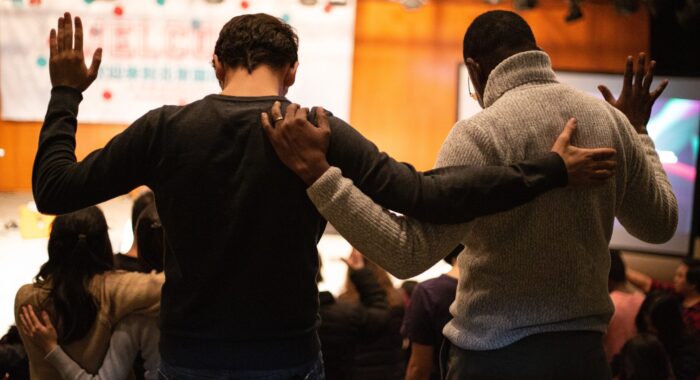Recent developments in national and international relations have produced a crisis in America of unparalleled proportions.
The nation is committed to a major war in Asia. In Europe, speculation and balance of payments deficits have dangerously drained American gold reserves. At home a social revolution with economic overtones has made arson, looting, mayhem and murder commonplace in some metropolitan areas. All indications are that civil disorders will increase. We may even see large areas of the United States paralyzed before another long hot summer is ended.
To meet this crisis in the nation, federal, state and local authorities have begun to mobilize their economic, manpower and judicial resources. The Congress has been asked to take up new legislation designed to supply a higher standard of living to the poor. A crash program of “community organization” has been launched to give racial and economic minorities more power in the determination of their affairs and greater benefits from a generally affluent society.
In such a situation the churches have begun to take emergency steps of their own to help meet the crisis. One denomination has committed some of its reserve funds to low cost, high risk loans for business development in the ghettoes. Another has launched a program of large-scale sponsorship of low-cost housing. Others have taken strong stands on behalf of better working conditions, legislative reform, and other aspects of social change.
Frankly confronting the crisis of these days and fully aware of the dangers facing the nation both abroad and at home, the National Association of Evangelicals affirms its desire to make its Christian witness in concrete as well as spiritual terms. We believe that at the local and the national levels we must find ways of expressing our interest in our neighbor’s physical welfare as we express our concern for the welfare of his soul.
Followers of a compassionate Christ are charged to be compassionate also. The Gospel which has been entrusted to us is a Gospel to the whole man and its effect must be seen in the social dimension as well as in the personal dimension.
At the same time we do not want to forget that only the Christian Church knows the root cause of alienation, prejudice and injustice. Only Christians know the Power which can change men’s hearts and make over society from within.
As evangelicals we believe the Christian Church has a unique and indispensable contribution to make to the current effort aimed at the betterment of mankind. This contribution is not of goods and services only, however urgent may be the need for economic justice. And this contribution is not of good will and recognition merely, however alienated and oppressed any people may be. As evangelicals, we would reaffirm the Biblical view that man is a sinner inclined to evil; that crises in human affairs are produced by selfishness and pride; that the spirit of alienation, rebellion and racism is universal, reflecting the native spirit of fallen humanity.
We have seen hostilities arise between men and among men who have never been directly caught up in the most often mentioned confrontation of our time, namely between black and white. We believe the “hippie” revolt, the student revolt, the morality revolt, the “new religion” are but symptoms of a deeper disease and that the disease will not be eradicated by yielding to the materialist’s estimate of the problem or the secularist’s program for its solution.
Belonging to this deeper disease are the tensions between races in virtually every part of the world, between classes within races and between different strata within classes. In every aspect of the current crisis we can see the sober truth that men of every color, class and condition are alienated — out of Christ they are fallen.
What is the answer? Contrary to popular opinion, we do not believe that alienations are healed by devised confrontations between those alienated. Nor do we believe that revolution is the key to social progress. Good deeds and legislative action may alleviate the social symptoms of the fundamental human problem, and by all means should be prominent in any society, but good deeds and legislative action are not enough. Is not this why the message of the church is denominated Good News?
Because the fundamental human need is the same, regardless of the external aspects of the crisis, the ultimate solution also remains the same. Whatever the immediate characteristics or dimensions of the latest cultural, political or racial upheaval, the basic mission of the Church of Jesus Christ remains unchanged by them. There is another crisis in the world which is not recognized by the greater part of humanity, the crisis of multitudes out of Christ. Concerning the desperate need to offer Jesus Christ as the only Savior of sinners there always is an infinite and cosmic urgency.
As evangelicals we must always labor to win men, not merely to move men. We must see that we are called to accomplish our objectives, not by coercion but by conversion. It is not in clashes and confrontations that we manifest God to the world, but in demonstrations of the power of the Holy Spirit to change lives.
Days of special crisis do remind us wherein we have failed in our primary duty. Many of us have been silent when we should have spoken, we have done nothing when the occasion called for our active testimony, we have been prejudiced and fruitless. We have passed our neighbor in the streets without showing concern, we have turned away when he was oppressed and afflicted, we have even failed to tell him, in love, that God wants him to come to repentance and salvation.
We have made it “business as usual” in our churches when we should have gone from house to house and into the streets with the Gospel. We have been recipients of the benefits of salvation without accepting the servant role which is also laid upon us.
What can we do? We can look about us in our own situations to determine the particular and perhaps unique context within which we should make our witness.
We can make our influence felt as citizens where concrete social action is justified in areas of domestic relations, education, law enforcement, employment, housing, equal opportunity.
As evangelicals we must humble ourselves, and pray, and seek the Holy Spirit’s power, and turn from our own ways into the life of faith. We must ask to be inflamed with a passion for the lost, willing, if necessary, to burn out for Jesus Christ.
A sin-sick world needs the salvation of God. We know how it may be saved. In this matter the world does not write our agenda nor do the circumstances of the times dictate our mission. These are given us of God. Our calling is to be faithful to Him.



 View All Updates
View All Updates 




























